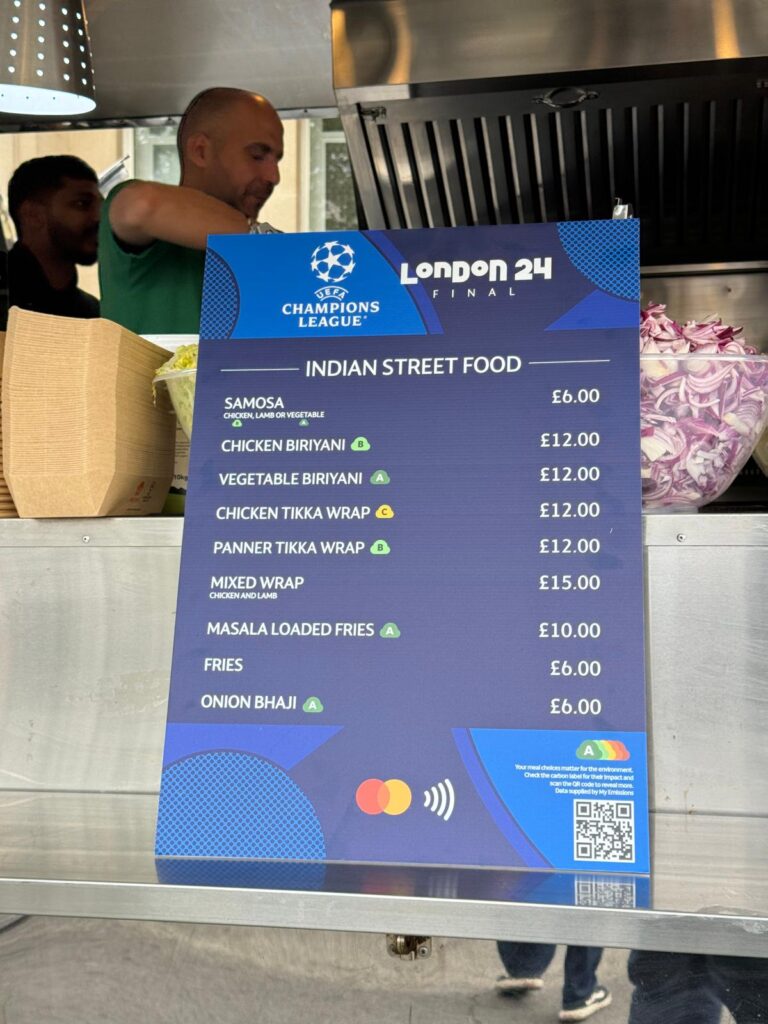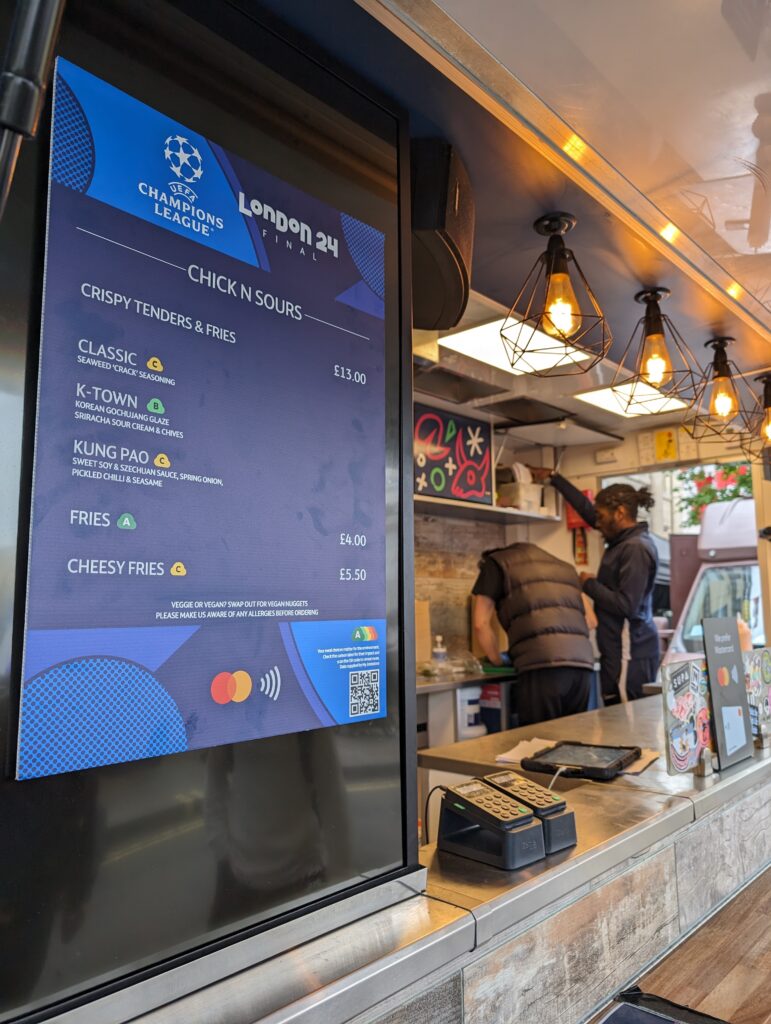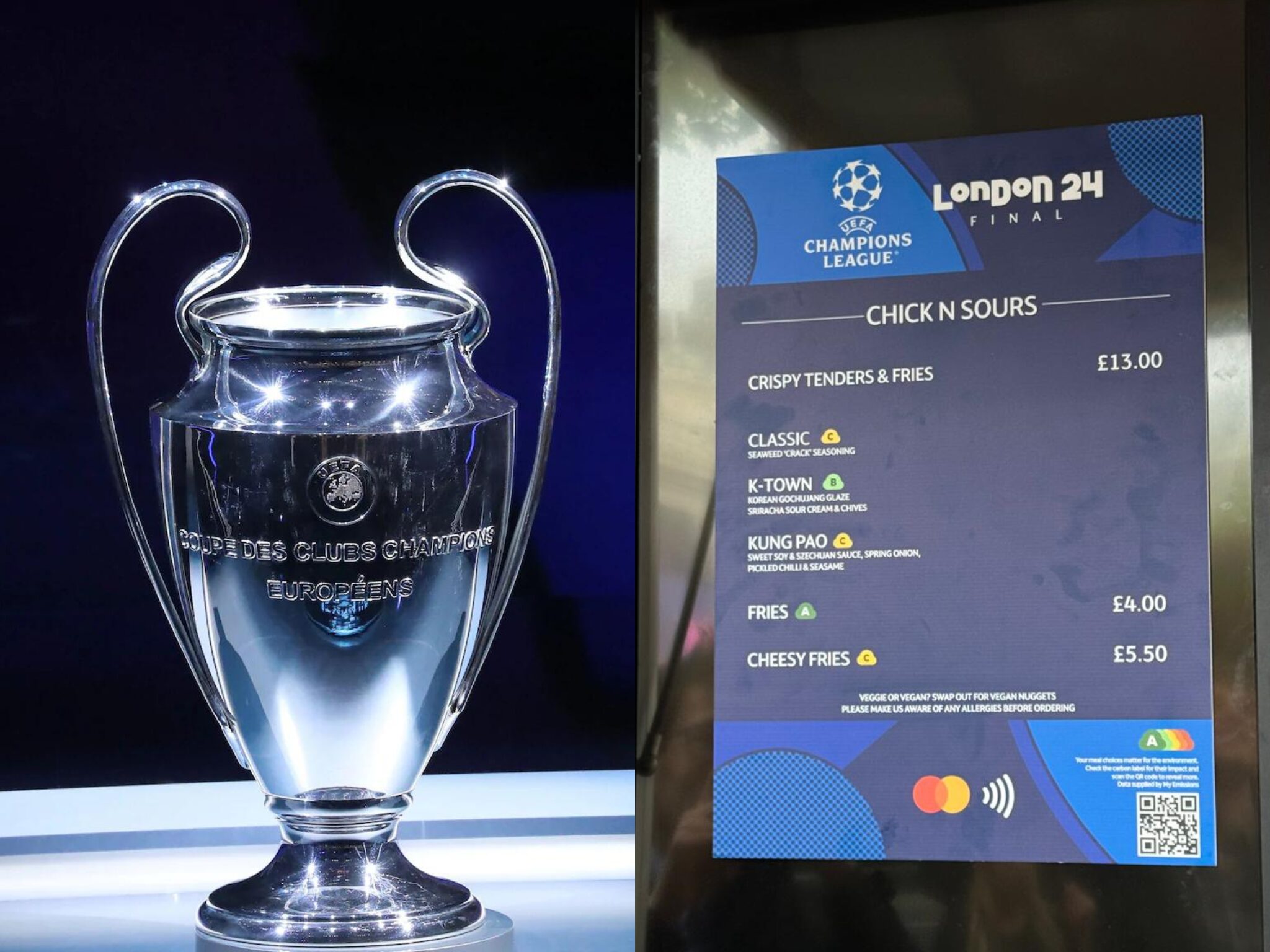UEFA Champions League to Roll Out Carbon Labelling at Wembley & Other Sites for 2024 Final
5 Mins Read
As part of its Champions Innovate initiative, UEFA has introduced a slew of sustainability measures for the 2024 Champions League final, which includes carbon labelling and plastic-free packaging.
Fans watching Real Madrid and Borussia Dortmund battle it out for the 2024 Champions League tomorrow will be eating carbon-labelled food in seaweed packaging, as UEFA – European football’s governing body – aims to amp up its sustainability credentials.
As part of its Champions Innovate initiative (announced in September), all menu boards at Wembley Stadium and food trucks at other Champions Festival sites across London will feature carbon labels from UK startup My Emissions. It’s an extension of the latter’s ongoing partnership with Dutch food delivery giant Just Eat Takeaway.com, a UEFA sponsor since 2021.
“Partnering with UEFA and Just Eat for the Champions League Final is an incredible opportunity to showcase our carbon labelling solution on a global stage,” said My Emissions co-founder Matthew Isaacs, who was selected for Forbes’ 30 Under 30 Europe Class of 2024 alongside his co-founder Nathan Bottomley. “Through Champions Innovate, we’re bringing our solution to one of the largest sporting events in the world.”
UEFA’s Champions Innovate sustainability initiative

Champions Innovate is UEFA’s collaborative programme to address key challenges around the 2024 final beyond just what happens on the pitch. It was created by the UEFA Innovation Hub in collaboration with English governing body the Football Association, the Greater London Authority, and its media house London & Partners.
The goal for the Wembley final (June 1) is to enhance the ESG impact of the competition, according to UEFA, which partnered with three of its sponsors, each of whom worked on different challenges with the selected startups.
PepsiCo – responsible for the six-minute kickoff show – is working on reducing the greenhouse gas emissions of the show, with the long-term goal of organising a net-zero show by 2030. For this, it was teamed up with kinetic energy startup Pavegen, which generates electricity from people’s footsteps. UEFA aims to use this smart flooring tech to power the pre-match show.
Meanwhile, Mastercard is working alongside sports sustainability charity Pledgeball to boost the adoption of the former’s carbon calculator, and create a league for fans who can most effectively reduce their carbon consumption.
Just Eat Takeaway has been working with UEFA to reduce single-use plastic packaging over the last two years, bringing in Notpla’s seaweed packaging at several matches and reusable packaging as part of a circular initiative. Now, its collaboration with My Emissions, which began in September last year for businesses to put emissions information on their in-app delivery menus, has become part of the UEFA Champions Innovate portfolio too.
As part of this, My Emissions will calculate and communicate the carbon footprint of food offerings with a simple A-E rating system on all menus at UEFA sites.
Two days before the Champions League final, each startup demonstrated their pilot at a showcase event at London’s City Hall. An expert jury then awarded an additional €45,000 to the competition’s winner.
Carbon labelling a good step, but UEFA’s climate footprint is enlarging

My Emissions’ carbon labels will be displayed across all concession boards at Wembley Stadium, in partnership with caterers Delaware North. “Given the results, Delaware North will use My Emissions to create the carbon ratings for the UEFA Champions League final and season menus into 2025 and beyond,” revealed Andrew Wilkinson, procurement systems manager at the catering company.
All food trucks at the Champions Festival sites – Regents Street, Somerset House, Potters Field and Trafalgar Square – will also sport the labels. They’ve been open to the public since Thursday, and will remain so until Sunday.
Meanwhile, packaging at all these sites will be provided by Notpla, and will include a QR code to a landing page on Just Eat Takeaway’s website. This page will aim to educate fans about the environmental impact of food, providing them with an opportunity to win tickets to matches in next year’s UEFA Champions League.
“We’re able to talk to fans about the carbon footprint of food on a scale that we’ve never achieved before and encourage consumers to make more conscious choices,” said Isaacs. My Emissions has previously also added carbon labels to Arsenal’s Emirates Stadium for World Earth Day, working directly with the same caterer.
“In addition to Wembley Stadium and the Emirates Stadium, Delaware North also cater food at the London Stadium (West Ham), as well as other sites across the UK,” he said. “Due to the success of labelling, Delaware North is already looking to make carbon labelling a permanent fixture on menus at Arsenal and other stadiums for next season.”
Football has a major impact on the climate crisis, with the global industry generating over 30 million tonnes of CO2 per year, about the same as Denmark. UEFA, meanwhile, aims to cut GHG emissions in half by 2030, and reach net zero by 2040. In March, it launched a carbon calculator for football stakeholders to help reduce the sport’s climate impact.
That said, the organisation is also changing the format of its club competitions from next season, which will see teams play 177 more matches across the three tournaments. It means teams and fans will be flying two billion air miles in 2024-25 (33% higher than 2022-23), equating to 4,000 journeys to the Moon and back. Travel alone will be responsible for over 480,000 tonnes of GHG emissions (a 30% increase).
So while it uses carbon labels and taps into kinetic energy for a one-off final, UEFA’s emissions are continuing to increase, taking it further away from its 2030 goal. Football and its stakeholders need to do a lot more.




